Basil I, The Man Who Would Be Emperor

The death of Emperor Nero in 68 AD marked a turning point in the history of the Roman Empire. For the 95 years prior to that, the freshly minted Empire, born from the ashes of the Roman Republic, had been ruled by a single family. The Julio-Claudian dynasty claimed its legitimacy from two sources – the divine Augustus, first Emperor of Rome, and his uncle the legendary Julius Caesar. But with Nero dead, the dynasty came to an end. Suddenly the Romans realised that imperial power was not a divine right, but rather the prerogative of any with the strength to claim it. The immediate aftermath was the civil war that became known as the Year of the Four Emperors, but the more long-term result was a fundamental shift in thinking. And when the Empire in the west collapsed, the Empire in the east continued to think that way. The Emperor was Emperor by divine right – but conversely, whoever became Emperor must have that right. To murder your way to the throne was simply to prove by attaining it that God had meant you to have it all along. Not for nothing does the phrase Byzantine politics still see use. In a cut-throat world such as this, it takes a certain kind of man to become Emperor. And for a peasant to become Emperor, that requires ruthlessness, cunning and duplicity in immense quantities. Basil I had all these in spades.
Basil was born in the Byzantine province of Macedonia to peasant parents. That much is certain. His exact birthdate, and indeed ethnic origin, remains a matter of some debate. This is not helped by the fact that Basil’s own propoganda machine when he became Emperor edited his upbringing severely, adding in details meant to legitimise his reign. [2] Even his name may not be the one he was born with – in the Greek that had become the language of the Empire at this point, “Basileus” meant King, and was actually the title used by the Byzantine Emperors. The most well-attested set of dates has him born in the 830s to parents of Armenian origin.[3] They had been abducted by Bulgarian raiders around 813, and managed to escape back to the Empire in 836. Basil was born some time before or after their return. When he came of age in the early 850s, he sought his fortune in the great city of Constantinople. There he befriended a monk named Nicolas, with one of those legends claiming that divine guidance led Nicolas to find him asleep in the porch of a church. Nicolas introduced him (through a doctor friend) to Theophilitzes, a relative of the Empress, who employed him as a groom. Basil possessed three skills that were to serve him well. The first was that he was extraordinarily strong. The second was that he had a real gift for controlling horses, which was what gained him the job with Theophilitzes. And the third was his knack for making valuable friends. One such friend was Danielis, an immensely wealthy widow who he met while visiting the Peloponnese peninsula with Theophilitzes. Danielis saw Basil’s potential, and in exchange for him adopting her son John as his brother, she became his patron, with her money granting him a level of security and a powerbase that would prove crucial to him in the years to come. Even after he became Emperor the two remained friends, with John being granted a position in the royal household and Danielis being given the the title of Royal Mother – essentially, the emperor adopted her into the royal family as matriarch. It was in 856 however that the young Basil gained the greatest patron possible. The Emperor.
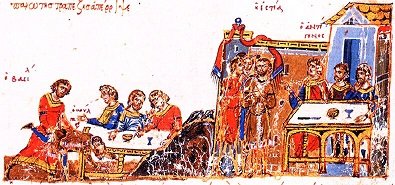
Basil first came to imperial notice at a wrestling tournament where he was originally a spectator. The victor was a Bulgarian, and whether to defend the honour of the Byzantines, or in memory of his parents’ captivity, Basil decided to challenge him. He destroyed the foreign champion, and this made him a hero to the whole city. When he managed to tame a horse belonging to the Emperor that had resisted all training, he was granted a position in the imperial bodyguard. His rise through the ranks of the imperial service was swift, mostly through the vacancies caused by the fall of those who displeased the junior Emperor Bardas [4] who was a paranoid and vicious man. This rise was confirmed in 865 AD, when Michael came to him with an unusual proposal. He wanted Basil to marry the Imperial mistress.
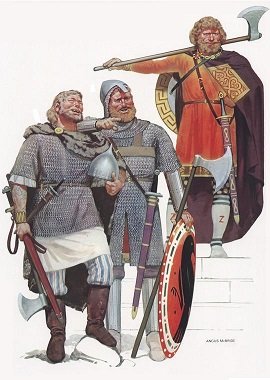
Eudokia Ingerina had been the Emperor’s lover since they were both teenagers, and it seems that the two remained utterly devoted to each other. However Eudokia’s family were both iconoclasts [5] and Varangians [6], both of which disqualfied them in the eyes of the Imperial matriarch, Dowager Empress Theodora. Michael had been forced by his mother to instead marry one of the brides she had chosen for him (a woman also named Eudokia, who made little impression on history besides this). Although his mother had been driven out of the imperial court by Michael (with the help of Bardas), the Emperor setting aside his wife for his mistress would be an immense scandal. As such, and since Eudokia was pregnant, Michael wanted someone to make her baby legitimate, and he turned to Basil to help him out. [7] Basil already had a wife (and a son by that wife), but that was easily set aside with the Emperor’s backing. The marriage gave the ambitious Basil a permanent hold on Michael, though it also led to some ridicule as he came to the relationship pre-cuckolded. The entire city knew well who the baby Leo’s father really was, and though officially Basil was his father, Eudokia still shared Michael’s bed rather than his. In order to make it up to him, Michael gave Basil a mistress of his own – the emperor’s sister, Thekla, who he removed from a nunnery and delivered to Basil. What Thekla thought of the affair is unrecorded.
It is clear that Michael saw young Leo as his successor, rather than the current official heir, the much older Bardas. Exactly what happened next is unknown. The official story was that Bardas plotted to take the throne for himself, and on discovering the plot Michael had Basil kill him. The real story was either that Michael had Bardas killed in order to clear the way for young Leo, or else that Basil pretended to discover a plot and killed him before reporting it to Michael. Regardless, this left the position of junior Emperor open, and Michael adopted Basil into the imperial family and made him junior Emperor. This may have been in order to make young Leo an Imperial family member (along with his new baby brother Stephen), but it left the ambitious Basil just one step away from the imperial throne.
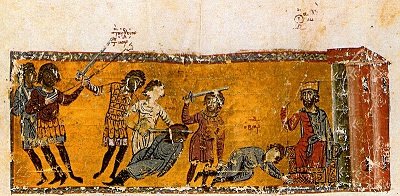
The relationship between Basil and Michael soon soured. Basil did not enjoy being the butt of the capital’s mockery, while Michael was unambiguous about the nature of Basil’s promotion – it had been done not for his sake, but for Leo’s. When Michael raised up another junior Emperor, a courtier named Basiliskianos, Basil confronted him. Michael’s reply was direct: “I made you Emperor, and have I not the power to create another Emperor if I will?” These words made the precarious nature of Basil’s position clear to him, and he decided that Michael had to go. At a party attended by the Emperor, Basil had the doors of the Emperor’s chambers rigged so they would not lock correctly. After Michael retired for the night, Basil and his accomplices (which included his father, brother and cousin as well as several of his low-born friends) burst into the bedchamber. They killed both Basiliskianos and Michael, [8] reportedly chopping off both of the Emperor’s hands as they hacked at him. Finally one of them (recorded as John of Chaldia) finished him off with a blow to the heart. And just like that, a peasant’s son from Macedonia became one of the most powerful men in the world.
The single most shocking thing about Basil I is that he was, in spite of his humble origins and bloody accession to the throne, a good Emperor. Of course, most of the surviving histories of his reign were created under his dynasty, but still, to found a dynasty that would last two hundred years is no mean feat in and of itself. During his coronation as Emperor, Basil publicly pledged his piety, dedicating himself to the service of God. An impressive display of brass neck from a man who the night before had helped murder his adoptive father. Still, Basil definitely got the empire back onto an even financial keel – the excesses of Michael, who was given the sobriquet of “the Drunkard”, had nearly emptied the imperial treasury. By putting a firm grip on spending and by demanding the return of some of Michael’s more extravagant gifts, he was able to restore financial stability without raising taxes, which he knew would make him popular with the lower classes he had so recently left. His greatest accomplishment, however, was the complete rewriting of the law code (replacing the old laws of Justinian, which were a poor fit for the new empire), creating the Basilika, named not for him but rather meaning “imperial law”. This massive undertaking was not finished in his lifetime, but was completed by his successor. The Basilika would remain the law code of the Byzantines for six hundred years until the fall of the empire in 1453, and in fact when Greece won its independence from Turkey in 1821 the Basilika served as their national law code for thirteen years until they had finished making their own new laws.
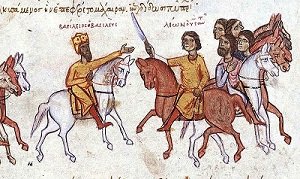
Basil may have been a good emperor, but he remained a bad man. This is easily seen in his treatment of Leo and Stephen, his “sons” by Eudokia. Stephen he had castrated and sent into the priesthood, while only Leo’s popularity with the populace and support among the church saved him from being blinded by Basil [9], who feared that Leo would avenge Michael’s murder. Perhaps the greatest indictment of Basil came from the manner of his death, however. While out hunting his belt was caught in the antlers of a deer that revived, and dragged him for a reported 16 miles through the woods. The injured Emperor was cut free by one of his attendants, but Basil then ordered the attendant be executed for bearing a knife in the imperial presence. Basil’s wounds became infected, and he died of a fever, having reigned as emperor for nearly twenty years. His eldest son Constantine had died, and though he had tried to promote his youngest son Alexander (the boy’s mother was Eudokia, but since he was born long after Michael’s death there is no doubt that Basil was his father), it was the studious Leo who succeeded him.
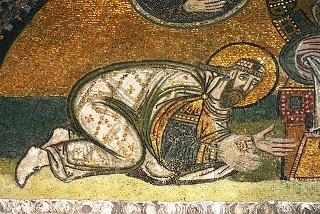
As if to confirm what everyone knew, the young Emperor’s first act was to have Michael III’s body exhumed from the lonely monastery on the coast where he had been interred, and ceremoniously reburied in the imperial mausoleum in the capital. With a slight diversion through a year of Alexander’s reign, it was Leo’s descendants who would rule the Empire thereafter. Though Basil established a dynasty, it may have been his in name only. Still, the man who had entered the city as a penniless vagabond seeking his fortune died as undisputed ruler of one of the greatest kingdoms on Earth at the time. Sometimes, being a terrible person pays off.
Images via wikimedia except where stated.
[1] This empire was christened Byzantium by those historians who wanted to draw a clear line and mark it as the Fall of the Roman Empire, though the Byzantines themselves drew no such line. To them, they were Romans, led by the Roman Emperor.
[2] The most extravagant of these claimed that his parents were actually descendants of both the Arsacid dynasty of Armenia, and also of Constantine the Great, seen at the time as the re-founder of the Empire.
[3] The other date sometimes given is 811 AD, but Basil’s adventure in the 850s are much less plausible if he was in his 40s rather than his 20s. Still, feel free to imagine that if you prefer.
[4] Who was actually the uncle of the actual Emperor, Michael. The position of junior Emperor had been around for centuries, and had originated in Rome as an extension of having a designated heir. It was the practice of dual Emperors that had eventually led to the East-West split. Not all Emperors made their heir junior Emperor, and not all junior Emperors actually got to inherit.
[5] The main divide in Byzantine society was between iconophiles, who believed that you should pray before a painting to help you focus, and iconoclasts, who regarded this as idolatry. Naturally this minor difference in belief led to thousands of deaths, widespread rioting and occasional civil wars.
[6] Varangian was the name given by the Byzantines to the Viking mercenaries, who both served in the empire and at the time were conquering modern-day Ukraine. Eudokia’s family were therefore immigrants from Scandinavia. In later years a unit of Viking-style fighters known as the Varangian guard would be one of the more eclectic elements of the Byzantine army.
[7] Rumours about the precise nature of Basil and Michael’s relationship were widespread even during their lifetimes. One factor was that the post of bodyguard involved access to the Emperor’s bedchamber, and was normally held by eunuchs (which Basil decidedly was not). Others include the fact that their eventual falling out will involve a younger man replacing Basil in Michael’s life. As such, it may be that Michael saw the union of his two lovers as a poetic solution to his problem.
[8] The fact that the bedchamber contained Basiliskianos and did not contain a bodyguard does lend some credence to the rumours about Michael’s sexuality, though some stories have him being deliberately guided to the wrong room when drunk in order to put him in place to be killed.
[9] Blinding was a popular method for the Byzantines to eliminate someone without taking on the sin or stigma of murder.
